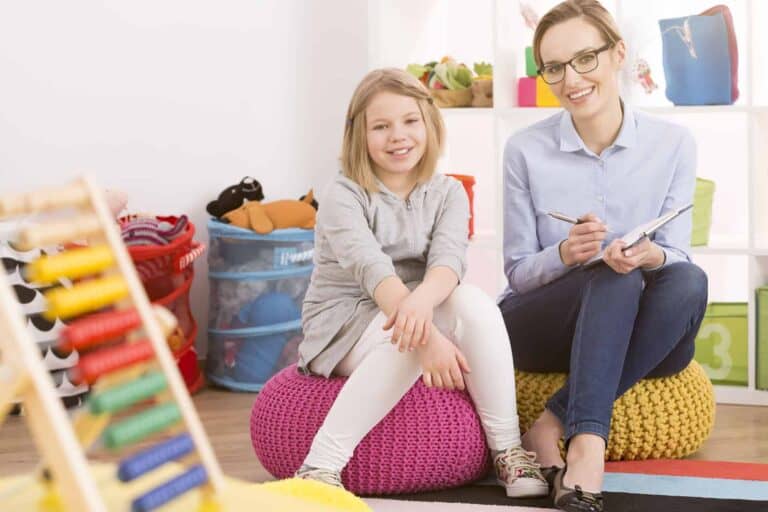Child & Teen Counseling in Frisco, Texas:
When and Why to Seek Help
In Frisco, Texas, our kids are growing up fast, facing all sorts of ups and downs. We try our best to give them everything they need: good schools, fun activities, and lots of love. But sometimes, they need a little extra help understanding their feelings and challenges. That’s where child counseling comes in. It’s like giving them a friendly guide for their feelings. In this article, we’ll chat about how counseling can help our kids be their happiest and strongest selves.
Child Counseling: Issues Addressed
Raising a child is like walking through a maze; every turn presents its own challenges. And, let’s face it, sometimes we all could use a little guidance to find the right path. It’s crucial to remember that reaching out for help isn’t a sign of weakness or poor parenting. In fact, it shows just how much you care. Seeking professional guidance through child counseling is a proactive way of making sure your child is happy, healthy, and ready to face the world with confidence.
Kids today face a lot of pressures – from schoolwork and friendships to changes at home or even just understanding their own emotions. Some common issues child counseling addresses include:
Anxiety and Stress: Kids might seem carefree, but they also face stress. Whether it’s worries about school or problems with friends, counseling can teach them ways to manage these feelings.
Behavioral Challenges: Acting out at school or home can sometimes be a sign that a child is struggling with something bigger. A counselor can help find the root of the problem and work through it.
Grief and Loss: Losing a loved one is tough, especially for a child who might not fully understand death. Counseling offers a safe space to process these feelings.
Family Changes: Big shifts at home, like a move, divorce, or a new sibling, can rock a child’s world. Counseling provides tools to help them adjust.
By understanding the challenges our kids face and getting them the help they need, we’re setting them up for success. Remember, it’s always okay to ask for help – for both you and your child.
Anxiety & Depression in Children
In the heart of Frisco, as children between the ages of three and six explore parks, make new friends, and attend their first days of school, they’re diving headfirst into a world full of novel experiences. Imagine seeing a huge slide for the first time or feeling the disappointment of a rained-out playdate. These events, though they may seem minor to us, can be enormous in their young eyes.
While feelings of apprehension or sadness are normal reactions to such situations, prolonged behavior like clinging too much to a parent, not wanting to play with friends, or even frequently complaining about stomachaches might hint at underlying issues like anxiety or depression. Picture for example, little Ava, who once was the star in her preschool playgroup, now she hesitates to even join in. This shift could be a sign that she’s grappling with something deeper.
Megan Corrieri is the leading child therapist in Frisco, TX.

MS, LPCC, LPC, NCC
Therapist | Licensed Professional Clinical Counselor | Nationally Certified Counselor
With years of dedication at a pediatric clinic, I’ve specialized in addressing the unique needs of children and teens. My approach prioritizes trust, resilience, and emotional understanding. With over 15 years in therapy, I am committed to helping young individuals navigate challenges and thrive.
Reach out today, and let’s set the stage for a brighter future for your child.
Changes at Home? A Child Therapist can Help
For many children, home is their world, especially during the formative early years. It’s their haven of familiarity, their constant in a rapidly changing environment. Naturally, any shift in this sanctuary often reverberates deeply within them, making changes at home one of the primary triggers for emotional distress in kids.
Parents might feel uncertain about addressing these shifts. After all, how do you explain a divorce, or the complexities of a new partner moving in, to young minds? Sometimes, what might seem trivial to adults can be monumental for a child. Consider the angst of moving homes. It isn’t just about packing boxes and shifting furniture; it’s about leaving behind cherished play spots, neighbors, and the security of a known environment.
Here are some household changes that might seem subtle but can deeply affect a child:
- New Partner: Your child might have adjusted to the idea of you dating post a divorce, but having someone new move in introduces a different set of dynamics, more so if the partner has children too.
- Change in Caretakers: The introduction of grandparents or other elderly relatives into the home can shift the attention dynamics, causing a child to feel side-lined.
- Siblings Moving Out: Especially in families with a significant age gap, a younger child can feel a deep void when an older sibling moves out for college or work.
- Introduction of a New Sibling: The joy of a new baby might mean an older child suddenly feels less in focus.
- Relocation: The trauma of leaving the familiar, from friends to their favorite tree in the backyard, can be overwhelming.
- Parental Separation: Navigating two households and adjusting to split routines can be challenging.
- Loss of a Pet: It often marks a child’s initial confrontation with grief.
Child therapists, with their toolbox of techniques, step in here, providing a bridge of communication. Through play therapy, a child might use toys to mirror their real-world concerns, or through storytelling, they might project their emotions onto characters. Like Max, who voiced his concerns of moving homes through tales of his ‘imaginary dragon’. Such narratives can offer invaluable insights into their minds, enabling therapists to guide them through their feelings effectively.
What a child counselor will do.
Imagine if your child had a trusted friend, someone they could talk to, who knows just the right things to say and do to help them feel better. That’s pretty much what a child counselor is. They’re trained to understand the unique ways kids think and feel. For example, a counselor might use games or drawings to help a young child open up about their feelings, or they might chat with a teenager about challenges they face with friends at school. By using techniques that resonate with kids, these counselors help them navigate the tough stuff without seeming confrontational or scary.
Building Trust: The foundation of Effective Counseling
Trust is everything. Remember when your child took their first steps? They trusted that you’d catch them if they fell. In counseling, building that trust between the child and the counselor is key. When a child feels safe, they’re more likely to open up about their feelings. A counselor in Frisco might take a kid for a walk in one of our lovely parks or just chat about their favorite movies before diving into deeper topics. Over time, as trust is built, the child can share their worries and fears without hesitation.
Real-Life Stories: Counseling Successes
Let’s talk about a real-life story right here from Frisco. Jamie, a 10-year-old, started acting out in school, often getting into trouble. His grades dropped, and he became distant. With the help of child counseling, it was discovered he was being bullied. With regular sessions, Jamie built up his confidence, learned ways to address the bullying, and eventually, his behavior and grades improved. It’s success stories like these that show the real value of counseling.
How do you tell your child they need counseling?
Starting a conversation about therapy with your child may seem daunting, but with the right approach, you can ease their apprehensions. Here’s how:
- Use Simple, Clear Language: Begin by keeping the conversation light and accessible. “You know how sometimes we talk to teachers when we’re stuck on math problems? Well, there’s a special person we can chat with when our feelings get all tangled up. They’re like a ‘feelings teacher.'”
- Normalize the Process: Explain that just like visiting a doctor for a physical ailment, sometimes we see a therapist for our feelings. “It’s like going to the doctor when we have a cold, but instead, we talk about our feelings and thoughts.”
- Relatable Examples: Drawing from their world of stories can be beneficial. “Remember how in [favorite show/movie], [character] talked to someone when they were sad or confused? It’s kind of like that.”
- Use Real-Life Examples (If Appropriate): If you or someone they know has benefited from therapy, share that. “Aunt Mia found it really helpful to talk to someone when Grandpa passed away. It’s okay to seek help when things get tough.”
- Provide Reassurance: Emphasize that seeing a therapist doesn’t mean they’re “broken” or “in trouble.” Instead, it’s about getting tools to handle tricky emotions better. “This doesn’t mean you’ve done anything wrong. We all need a bit of help sometimes.”
- Involve Them in the Process: If age-appropriate, involve them in choosing the therapist or deciding the time for the sessions. Feeling a sense of control can ease anxiety. “Would you like to meet them on a Wednesday after school or Saturday morning?”
- Stay Open to Questions: Encourage them to voice any concerns or questions. “It’s okay if you’re feeling unsure. Let’s figure this out together.”
Remember, the end goal is to ensure your child feels supported and understood. Their journey with counseling will be unique. Your role is to be the steady hand guiding them towards resources that can help them thrive.
When should you seek a child therapist?
Children, with their boundless energy and changing preferences, can often be enigmas. They’re learning and growing every day, trying out new likes and dislikes, and facing new challenges. But amidst these ever-changing waters, there are signals that may suggest they need a little extra support.
| Sign | Description |
|---|---|
| Consistent Behavior Changes | If a usually outgoing child suddenly becomes withdrawn for weeks, or the reverse, it may indicate deeper emotional or psychological issues. |
| Drastic Shifts in Mood | While mood swings are common, extended periods of sadness, anger, or disinterest in activities may suggest underlying problems. |
| Changes in School Performance | Declining grades or teacher feedback about behavior can indicate issues, possibly stemming from academic pressures, bullying, or social problems. |
| Sleep Disturbances | Patterns like insomnia, nightmares, or waking up often during the night can serve as a warning sign. |
| Changes in Social Interactions | A child avoiding friends, showing disinterest in social events, or expressing loneliness might be signs of social anxiety or related concerns. |
| Expressing Feelings of Hopelessness | Direct or subtle mentions of hopelessness, worthlessness, or not wanting to be alive are grave concerns that need immediate attention. |
| Regressive Behavior | Older kids reverting to younger behaviors, such as bedwetting or thumb-sucking, might be expressing stress or anxiety. |
| Physical Complaints | Regular, unexplained physical complaints like headaches or stomachaches can be a manifestation of emotional distress. |
When in doubt, trust your parental instincts. If something feels off, it’s okay to seek guidance. It’s always better to be proactive, even if it’s just to get reassurance. Remember, seeking a child therapist is not about finding out what’s “wrong” with your child—it’s about giving them the tools and support they need to navigate life’s challenges.
Benefits of Child Therapy:
Therapy isn’t just about solving problems; it’s about equipping our children with tools to understand their emotions better. It can boost their self-esteem, teaching them coping strategies for life’s challenges. Imagine if nine-year-old Lisa learned how to channel her anger into art or if ten-year-old Sammy acquired skills to combat his anxieties before a big test. Therapy provides these invaluable life skills.
“My daughter, after just a few sessions, started opening up more at home. She’s more confident and even made two new friends last week!” – Testimonial from a Frisco parent.
Some of the benefits of child counseling may include:
| Benefit | Description |
|---|---|
| Improved Emotional Understanding | Kids learn to recognize and verbalize their feelings, making it easier for them and others to address them. |
| Boosted Self-Esteem | Therapy can provide children with a sense of self-worth and confidence in their abilities. |
| Enhanced Coping Strategies | Whether it’s deep breathing techniques or channeling emotions through art, kids gain tools to manage life’s ups and downs. |
| Better Social Skills | Therapy can aid in improving communication and building relationships, helping children make and maintain friendships. |
| Academic Improvement | By addressing underlying emotional or social issues, children can focus better on their studies, leading to improved school performance. |
| Conflict Resolution Skills | Kids can learn how to address disagreements or misunderstandings in a healthy, constructive way. |
| Greater Resilience | Therapy can equip children with the skills to bounce back from setbacks, helping them face future challenges with more grit and determination. |
Children who engage in therapy early on are often better equipped to handle life’s challenges compared to their peers who don’t receive such support. They carry with them a toolkit of coping mechanisms, a deeper understanding of their emotions, and a resilience that can positively impact their academic, personal, and professional lives as they grow older.
Every child deserves the best shot at a happy, fulfilling life.
Ensuring our children’s mental well-being is as crucial as their physical health. We, as parents, teachers, and community members in Frisco, need to recognize the signs and be proactive. And remember, if ever in doubt, Megan Corrieri is just a call away, ready to guide and support.

Owner, Clinician, Wife & Mom
Share:
These resources offer a mix of practical advice for parents, insights into child psychology and development, and a deeper understanding of therapy practices. They’re recognized in the fields of child psychology and counseling and can provide valuable expert information for parents seeking to understand or utilize child therapy:
| Resource Title | Author/Researcher | Source/Publication |
|---|---|---|
| “The Whole-Brain Child” | Dr. Daniel J. Siegel and Dr. Tina Payne Bryson | Delacorte Press |
| “How to Talk So Kids Will Listen & Listen So Kids Will Talk” | Adele Faber and Elaine Mazlish | Scribner |
| “Child and Adolescent Therapy: Science and Art” | Jeremy P. Shapiro | John Wiley & Sons |
| “Understanding Child Development” | Rosalind Charlesworth | Cengage Learning |
| “Handbook of Child Psychology” | William Damon and Richard M. Lerner (Editors) | Wiley |
| “Play Therapy: The Groundbreaking Book That Has Become a Vital Tool in Child Psychotherapy” | Virginia M. Axline | Ballantine Books |
| “Child Psychotherapy: Practice and Theory” | Florence W. Kaslow | Routledge |
| “The Interpersonal World of the Child: A View from Psychoanalysis and Developmental Psychology” | Daniel N. Stern | Basic Books |







